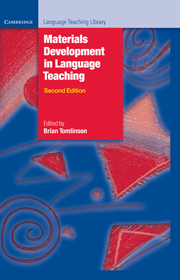Book contents
- Frontmatter
- Contents
- Preface
- Glossary of basic terms for materials development in language teaching
- Acknowledgements
- 1 Introduction: principles and procedures of materials development
- Part A Data collection and materials development
- 2 Using corpora in the language classroom
- 3 Concordances in the classroom without a computer: assembling and exploiting concordances of common words
- 4 Telling tails: grammar, the spoken language and materials development
- Comments on Part A
- Part B The process of materials writing
- 5 A framework for materials writing
- 6 Writing course materials for the world: a great compromise
- 7 How writers write: testimony from authors
- Comments on Part B
- Part C The process of materials evaluation
- 8 The analysis of language teaching materials: inside the Trojan Horse
- 9 Macro- and micro-evaluations of task-based teaching
- 10 What do teachers really want from coursebooks?
- 11 The process of evaluation: a publisher’s view
- Comments on Part C
- Part D The electronic delivery of materials
- 12 Developing language-learning materials with technology
- 13 New technologies to support language learning
- Comments on Part D
- Part E Ideas for materials development
- 14 Seeing what they mean: helping L2 readers to visualise
- 15 Squaring the circle – reconciling materials as constraint with materials as empowerment
- 16 Lozanov and the teaching text
- 17 Access-self materials
- Comments on Part E
- Conclusions
- Recommended reading
- Index
5 - A framework for materials writing
Published online by Cambridge University Press: 09 February 2023
- Frontmatter
- Contents
- Preface
- Glossary of basic terms for materials development in language teaching
- Acknowledgements
- 1 Introduction: principles and procedures of materials development
- Part A Data collection and materials development
- 2 Using corpora in the language classroom
- 3 Concordances in the classroom without a computer: assembling and exploiting concordances of common words
- 4 Telling tails: grammar, the spoken language and materials development
- Comments on Part A
- Part B The process of materials writing
- 5 A framework for materials writing
- 6 Writing course materials for the world: a great compromise
- 7 How writers write: testimony from authors
- Comments on Part B
- Part C The process of materials evaluation
- 8 The analysis of language teaching materials: inside the Trojan Horse
- 9 Macro- and micro-evaluations of task-based teaching
- 10 What do teachers really want from coursebooks?
- 11 The process of evaluation: a publisher’s view
- Comments on Part C
- Part D The electronic delivery of materials
- 12 Developing language-learning materials with technology
- 13 New technologies to support language learning
- Comments on Part D
- Part E Ideas for materials development
- 14 Seeing what they mean: helping L2 readers to visualise
- 15 Squaring the circle – reconciling materials as constraint with materials as empowerment
- 16 Lozanov and the teaching text
- 17 Access-self materials
- Comments on Part E
- Conclusions
- Recommended reading
- Index
Summary
Introduction
In this chapter we offer the reader a practical idea of the different aspects of the process of materials writing by teachers for the classroom. This is achieved through case studies illustrating the process.
The starting point for this practical overview derives from the thoughts and feelings of those most involved with language materials: the comments below are the authentic voices of students and teachers of English as a foreign language. Each statement appears to have materials-writing implications.
Exercise
As you read through the remarks, you may like to cover the commentary beneath each one and make a brief note about what you feel the materials-writing implications to be, focusing both on the opinions expressed and the language used.
I have noticed that the coursebook I use doesn’t seem to deal with ‘real’ English.
(Italian secondary school teacher)
My demand is becoming a reporter of the English football and I need, so, much familiarity …
(Danish upper-intermediate student on a full-time intensive course in a British school)
There are many sources of real English within language-learning publications but clearly our Italian teacher is working with materials, perhaps prescribed, that fail to employ authentic language or texts (see Chapter 4 by Ronald Carter, Rebecca Hughes and Michael McCarthy in this volume). She has thus identified a need for materials. Similarly, though in a different context, the second quote identified a need for new materials, particularly a variety of text-types for listening and reading, since there is no widely available book or set of materials known to the authors that caters for the precise needs of this Danish student .
The textbook my institute has written says that you use ‘please’ and ‘would’ for simple requests and ‘would you mind’ for more polite requests. I have heard lots of other things such as ‘could you possibly …’ (Croatian evening institute teacher)
I get very confused with all these noughts and zeros and nothings in your language …
(Argentinian part-time student on a low intensity course in Britain)
The evening institute has identified a need for materials that practise making requests, but clearly the Croatian teacher feels that she does not know enough about the language of requests to teach it as effectively as she would like to do.
- Type
- Chapter
- Information
- Materials Development in Language Teaching , pp. 107 - 134Publisher: Cambridge University PressPrint publication year: 2011
- 18
- Cited by

